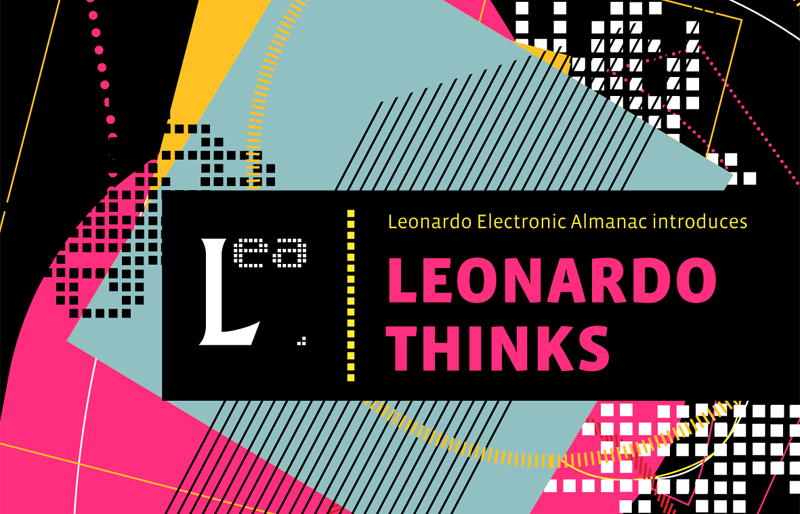
LEONARDO THINKS 1968 – 2011
Contemporary Opinion by Wasim Maziak
Wasim Maziak argues for the importance of an institutionalized front of scientists and artists for world peace and sustainability.
On the Verge of Avalanche
The end of the Cold War ushered in an era of optimism for a safer and more inhabitable world. Many thought, rather naively, that, with the disappearance of conflicting superpowers, elements of struggle and antagonism would be neutralized. Sadly, this hopeful moment was short-lived, as the world awakened once again to cries of battle along virtually every line of segregation between people and nations. On the environmental front the situation is even worse. Pollution and resource depletion that previously took place over the span of centuries are now occurring in one short human lifespan. Fueled by narrow ideological or economic interests and not able to utilize the collective wisdom of history, we seem insistent on reliving the mistakes of the past. Some of us may now have longer and healthier lives, but the fruits of this progress
are grossly mal-distributed, with the majority of the world’s population receiving hardly any. Achieving the minimum dignified existence has become a remote possibility for most of the world’s population—a certain formula for trouble.
Throughout history, whenever an ideology is given a political machine, it becomes a vehicle for cruelty and destruction. Ideologies do not recognize individuals, gray areas, self-criticism or anything outside their narrow boundaries. For in service of the ultimate truth, all means and sacrifices are justified. Corporate interest, on the other hand, is a driving force in many conflicts and wars as well as global health and environmental problems. We see political ideologies or aggressive economic interests—or worse, both—at the heart of every current human or natural conflict. Our world today, alas, is shaped by greed and politics.
While globalization and growth may have their positive effects, we must understand that we have reached the limits of our ecosystem’s endurance, and that already cultures have reached the clashing point. Unless we create a global cushion to ameliorate our contact with nature and each other, as well as develop effective brakes for the mad drive of politics and business, our civilization’s collapse is inevitable. This conclusion is based on facts and supported by unmistakable signals. The rates of climate change, accumulation of greenhouse gases, deforestation and rising sea levels are outpacing not just the most dismal predictions, but also, more importantly, nature’s own capacity to adjust. On the human front, it is hard to think of another point in history when hatred between nations and groups has been more rampant or vicious.
The creation of this global cushion is emerging through a multitude of human rights and environmental groups on the grassroots level and international institutions and treaties on the governmental level. This movement, however, is still unsynchronized and undermined by influential political and economic interests and at times better at pointing out the problem than at finding viable solutions. The strengthening and coordination of this movement has never been more urgent, and its reinvigoration by the critical mass of scientists and artists has never been more sorely needed.
Understandably, scientists and artists may be the least willing to be involved in “politics,” and many, rightly so, consider such involvement to be a distraction from creativity and inventiveness. Unfortunately, the luxury of devoting one’s whole self to probing into the wonders of science and the arts is one we can no longer afford. Neither art nor science can thrive in an unstable, depleted world. Scattered goodwill initiatives such as Live Aid should now be replaced with an institutionalized front of scientists and artists for world peace and sustainability. Leonardo could aid in such a coordinated response.
The struggle ahead is not an easy one. We face a mix of big interests, rigid human beliefs, selfishness and ignorance. Creative solutions must provide lucrative alternatives that make investing in peace and nature the most rewarding choice for both the short and long term. The usual goodwill jargon and north-south course of global initiatives is not going anywhere.
A genuine democratic dialogue can provide a learning experience for the revival of common human values at the expense of narrow cultural fervor. The battle must be fought: at stake is nothing less than the lives and welfare of our own children and beloved. If we do not prove ourselves capable of using past experience to inform the future, we are a species doomed for extinction.
Wasim Maziak is a Professor of Epidemiology and Biostatistics at the University of Memphis. More information about his work is available at http://wmaziak@memphis.edu. His email is wmaziak@memphis.edu.
ISSN No: 1071-4391
Author: Wasim Maziak
Professor, Epidemiology and Biostatistics
Email: wmaziak@memphis.edu
Originally published in: Leonardo April 2006, Vol. 39, No. 2: 95–95
Print: ISSN 0024-094X, Online: ISSN 1530-9282, DOI: http://www.mitpressjournals.org/doi/pdf/10.1162/leon.2006.39.2.95.
Leonardo is a registered trademark of the ISAST.
